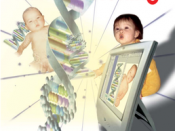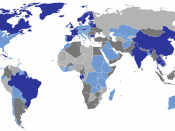According to definition, cloning is simply one organism created from another resulting in the two having the same set of genes. If this is the case, then cloning has been around in nature since practically the beginning of time. Plants for example have been known to occasionally self-pollinate, earthworms regenerate the rest of their body when split half, and human twins can share the same DNA technically making them clones depending on how strict the definition is. Since then, cloning has been taking place in labs since the 1800's. Hans Dreisch was the first to clone an animal in his experiment involving sea urchins. In 1902, Hans Spemman cloned two adult salamanders by means of his "fantastical experiment" which he placed the cells from the embryo inside another salamander to be born naturally as a clone. After this there were no major advancements until November of 1951, when a scientist used the same procedure to clone and adult frog for the first time.
It was then in 1986 that a breakthrough came. A team of scientists led by Steen Willadsen cloned the first mammal embryo. The group first cloned the cell of a sheep, and then that of a cow. Years later a man name Ian Willmut was assigned to the same project. After 276 failed attempts, Willmut finally cloned the controversial Dolly the sheep, and amazed the world. This was the last major event to take place in the cloning world. Since the creation of Dolly, there has been the cloning of mice herds, but nothing much since then. The only thing that scientists feel they have left to accomplish is to clone a human being. Since Dolly however, laws banning government funding for the research and development of human cloning have been passed. The issue of cloning a person has been a heated debate all over the world since it first became feasible. It has basically been a question based upon people's morals. Many people think that to play God is no place for man to go, and that there is no benefit great enough by cloning humans that would be worth doing something so unethical.
The issue of human cloning is the one that sparks an abundance of argument. A total ban on human cloning has been suggested and been approved by congress. There are many advantages to a total ban on human cloning. The ban eliminates a possibility of jeopardizing human individuality and a loss of genetic variation. With cloning legal, there is a possibility of a "black market" that would illegally distribute cloned body parts. There is a low fertility rate in the previous cloned animals, thus suggesting that technology is not advanced enough for cloning humans. If cloning occurred, there is a possibility that clones would be treated as second-class citizens. The issue of ethics and morality is a major factor in deciding to ban human cloning.
The possibility of jeopardizing human individuality is present if there were human clones. A scientifically engineered clone would not carry his own traits; he would rather be an exact duplicate of an existing person. The clone would carry the same genetic predispositions and conditions as the host. The similarities in cell structure and DNA would be overwhelming, thus eliminating individuality in clones. Cloning would cause a lack a variation in the gene pool.
A black market of human body parts is a problem that may arise if cloning were legal. Many clones would be created to produce healthy body parts for victims of disease. As House Majority Whip Tom DeLay put it, "Human beings should not be cloned to stock a medical junkyard of spare parts". If produced, those "spare parts" could be the basis of a massively illegal black market.
At the present time, technology is not strong enough to successfully clone humans. In experiments such as the famous "Dolly", many embryos were lost before a successful clone occurred. Understanding the complexity of cloning suggests that to clone a human would be nearly impossible based on today's technology. A fear that clones would be treated as second-class citizens is present when considering human clones. A human clone could suffer great psychological ailments.
The most controversial argument when dealing with human clones is the issue of ethics and morality. Many argue that cloning human beings would be "playing God". It is suggested that using clones for "spare parts" is morally wrong. It has been suggested that engineering a human clone for desirable traits is the same as the nazi's attempt to create the perfect race during the holocaust. Religious leaders across the world are against human cloning. It is agreed among many that human cloning is ethically and morally wrong.
Despite all the reasons that there is to ban human cloning, many people still feel there are plenty of reasons not to put an absolute ban on the technology. One argument that many people have in this debate is that cloning can help to people to live longer by altering genes. Although that may be a good theory, there is no evidence that something like this can work. Supporters of cloning also say that by using this technology couple that has lost a child due to a tragedy could then be recreated. What people don't understand is that although the clone may look like the lost child, there is no way that it could have the same personality. The way people become who they are is based upon the events that happen to them in their life. A clone of a previous child would not only go through the same things that the original person did, but it would grow up never meeting the expectations of the parents. To assume that a clone can replace a human being and live a normal life is ignorant and cruel. A similar argument is that cloning children can help infertile couples have children. This too is another good idea in theory, but this can be accomplished with more ease by artificial insemination. In addition, to clone a random child for a couple would be no different then adopting. The resulting child would have the characteristics of another person rather than the parents. The only other possibility would be if the clone were to be made up of genes from the one of the parents. This would be yet even more bizarre because it would be as though a woman would give birth and raise a child that was technically herself or her husband.
The cloning of human parts is without question an amazing accomplishment to modern technology, but in our opinion this is just a beginning to an unethical world where there are no boundaries. It comes down to a question of morals. Granted, cloning humans could have some benefits to society such as being able to correct deficiencies in genes, which in turn could help to cure cell problems that would otherwise go unsolved. Cloned body parts could be used for medical transplants. Cloning could also benefit sterile couples allowing them to have children.
Although the use of cloned cells to correct abnormalities in genes could be beneficial to man, we feel that the risk isn't worth the attempt. The technology now isn't advanced enough to know for sure whether or not this could actually be done. In addition, by use of any cloning, other genetic problems may occur due to the altering of the natural gene patterns if two people with cloned genes were to reproduce. We also found that many experts say that the diseases that can be cured by cloning technology can also be cured by alternate methods.
Just like with the cell research, technology right now isn't strong enough to clone just a body part. To continue research for the advancement of human cloning would be extremely expensive. At the present time due to the current war, the issues with social security, and the national debt, the government cannot afford to fund the research for human cloning. Before being able to clone just a body part, scientists would have to clone an entire person. Using just the clone's body parts for medical purposes would be no better than murdering a regular person for the same reason. We feel that cloning for parts just isn't a legitimate reason to clone humans.
As for the purpose of cloning to allow infertile couples reproduce, we feel that it is unnecessary because things like artificial insemination and adoption exist for the same reason. To invest in human cloning for this reason would once again be a waste of government spending.
We feel that the greatest argument for a ban on human cloning is the issue of ethics. The majority of religions are strongly against the act of cloning. Government funding for human cloning would cause an uproar amongst the religious world. It is widely considered around the world that cloning is "playing God" and for that reason it should not be done. Although some opinions may vary, we, along with the general consensus agree on this standpoint. It is just as unethical to clone parts, as it is to clone an entire person. We learned that according to the Bible (which is held by most people as the basis of their morals) that human beings are meant only to reproduce by conventional means. Overall we believe that human cloning is completely unethical, therefore we firmly support a ban human cloning.
Cloning will remain a heated debate for years to come. Recently the House of Representatives voted in favor of a bill that banned the governmental funding of cloning. Only time will tell whether or not people change their views on the issue of human cloning. Until the idea becomes more socially accepted a ban on human would be in the interests of society.





